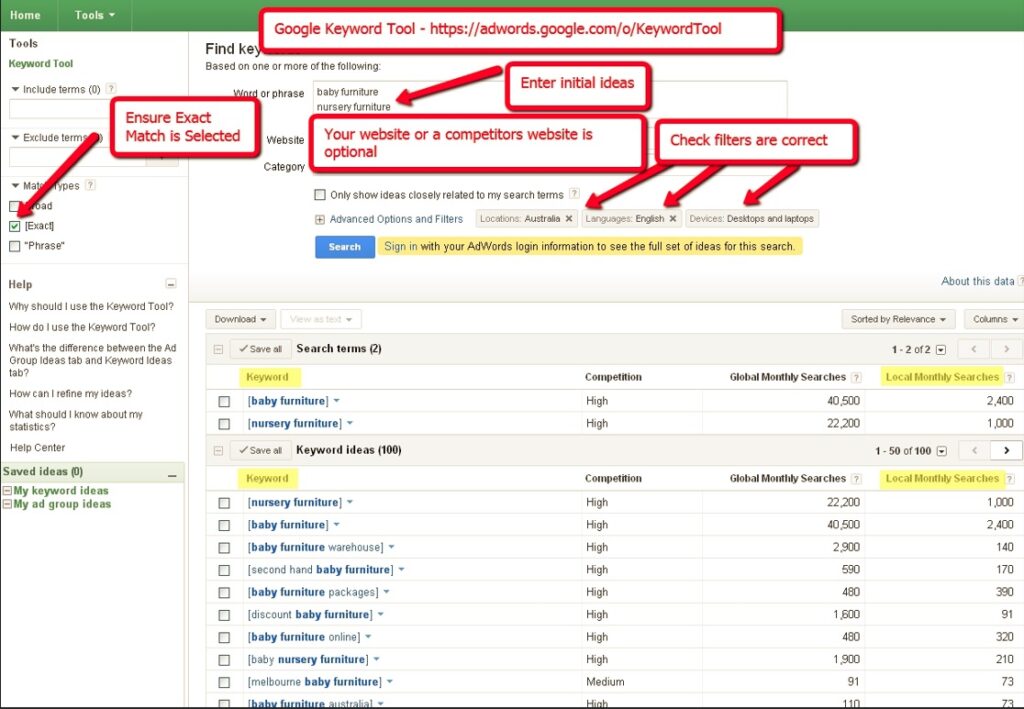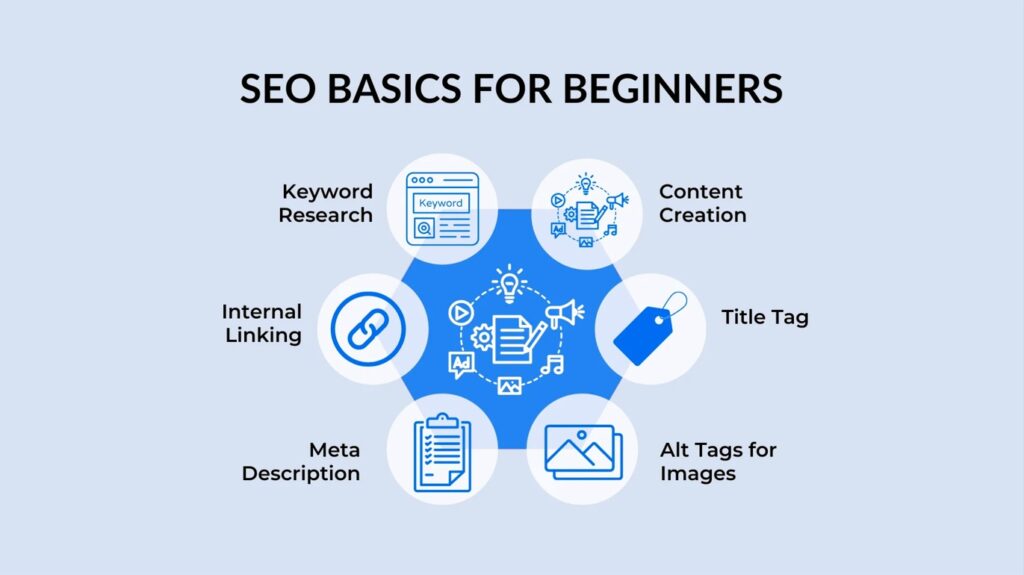Introduction to SEO for Dummies
SEO is critical for those who want to popularize their website in today’s technological world. Basic SEO knowledge is essential for business owners, bloggers, or other Internet users. In the following ‘SEO for Dummies’ guide, you will find out the fundamental principles of efficient SEO and the techniques to master the complexity of SEO.
What is SEO?
SEO stands for search engine optimization. It’s a technique for promoting a specific website in the SERPs. The higher your site’s rank, the more exposure it has and, consequently, more traffic. In the present guide, we discuss on-page and off-page optimization strategies, explained below.
Why SEO Matters
Knowing how to work on SEO is crucial since it gets your website to the right people. In the context of millions of websites, a great SEO plan means that the content is viewed by those interested in specific information or a particular type of product you provide.
The Elements of Search Engine Optimization
Keyword Research

Keywords are one of the most critical components of SEO. They are the words and expressions entered into the engine by the users. To use keywords efficiently and your chosen primary keyword – SEO for Dummies, you should understand what your audience seeks. Google Keyword Planner, SEMrush, or Ahrefs are the tools that allow you to identify keywords with high traffic but low competition.
This aspect deals with making individual pages, that is, every website page, search engine friendly. Important elements include:
Title Tags and Meta Descriptions: Using good and relevant meta titles and descriptions is imperative. For example, “SEO for Dummies:
Header Tags (H1, H2, H3): I should arrange the content sequentially and blend in the keywords.
URL Structure: Make URLs look compact using keywords.
Content Quality: Content should be comprehensive and original and should have a lot of value. In other words, make your writing as clear and easily read as possible.
It is a form of marketing outside the website, though its primary aim is to help increase your website’s reputation and credibility. Key strategies include:
Backlinking: Obtain a Lot of backlinks, especially from related websites with good page rankings. Guest posting, influencer marketing, and partnerships are also possible.
Social Media Engagement: Promote your content and interact with the users within various social media networks.
Online Reviews and Reputation Management: Prescribe it to be attended to as actively as possible and encourage positive reinforcement.
Advanced SEO Techniques
Make sure that the technical side of your website is well-optimized. It must be fast-loading, friendly to mobile users, and must use secure Hypertext Transfer Protocol (HTTPS).
User Experience (UX)
A user-friendly website tends to attract more users who spend time on it while reducing bounce rates, and search engines always value this.
Create and post content regularly by making a calendar indicating the scheduled posting dates for new material. To reach a broader audience segment, serve various content, such as blogging, videos, and infographics.
Analytics and Reporting
Track, analyze, and organize the information with the help of tools like Google Analytics to define the site’s performance and the positive and negative influences on traffic and user behaviour. These include the following: The analysis process allows for SEO activity refining.
SEO Trends to Watch
Continuing to read and watch updates on SEO is helpful because it assures that your methods or plans are suitable. They are Voice Search Optimization, Artificial Intelligence and Machine Learning in Searches, and Accessibility of Content.
Standard SEO Mistakes to Avoid
Therefore, SEO professionals need to tread carefully with certain things when working on any website to avoid hurting the visibility of their client’s site in the online marketplace. Here’s how to navigate around these common mistakes
Keyword Stuffing: However, it means that it’s right to use only such keywords that would be necessary and useful for the containing reading but to stuff the content with the keywords and use it excessively may be harmful to the text and for connection to search engines. Concentrate on writing naturally and organically and only incorporate the keywords wherever they fit.
Ignoring Mobile Users: Mobile searches are more common than desktop searches, so having a mobile-friendly website has become compulsory. Check to make your site responsive to ensure visitors have the same experience regardless of their device.
Neglecting User Intent: Ensure that it is what your spectators are looking for in terms of content. Identifying users’ different intents when searching for a specific keyword can help create a better strategy for selecting keywords and creating better content for the audience, hence improving engagement and conversion.
Skipping Technical SEO: This applies to its design and technical aspects: a technically favourable website = success. Some common structural problems are page slow loading, broken data links, and poor site structure that will work against SEO.
Overlooking Analytics: Always evaluate your websites from time to time. Self-assessment is another good practice that allows you to assess the results and find out which aspects were compelling and which would require improvement using Google Analytics and Google Search Console.
Duplicate Content: If two or more URLs contain similar or the same content, search systems will be baffled, and the ranking will go down. The issue can be resolved using canonical tags or having the company produce unique content.
Unoptimized Meta Tags: Titles and meta descriptions should be as charming as possible and contain the main terms. They are essential in this aspect, for they are to draw clicks from the results page.
Poor-quality content is fast and loose, not slow and steady. Concentrate on creating helpful, informative, and well-researched content that will give solutions to problems or answers to questions that your audience may be seeking.
Insufficient Internal and External Links: Both kinds are beneficial in leading users through your site and creating channels that enable search engines to locate your articles. Ensure you do proper internal linking and gain the correct external links.
Failure to Adapt to Algorithm Updates: Search engine algorithms are continually updated. Ensuring that the firm is alert to the latest occurrences within the industry and making specific changes to the strategies when such occurrences present themselves can place one at an advantage.
Beyond the Basics: Advanced SEO Strategies
Having learned the low-hanging fruits of SEO mistakes, it’s time to review the basics of SEO. Allow me to introduce the next level of SEO that will take your website to the next level, literally to the top of the search engine rankings.
Voice Search Optimization
Thanks to virtual assistants like Alexa, Siri, and Google Assistant, it has become essential that the website is optimized for voice search. It includes paying close attention to natural language keywords and including conversational phrases within the content.
Artificial Intelligence and SEO
AI plays a critical role in altering how content is identified and ranked in search engines. AI technologies may also reveal consumers’ patterns and preferences, which can be helpful when handling content.
Visual and Video SEO
Use high-quality images and videos to enrich the content. Create definite items to add spectacular titles, tags, and descriptions, increasing the findability rate and helping in interaction.
Local SEO Enhancements
Local-based businesses must optimize for local search. Check directory entry data to ensure harmony, promote your business so customers can offer feedback, and choose the best Google My Business profile.
Structured Data and Rich Snippets
By using structured data, or in other words, schema markup, on a website, the context in which the content is is understandable to Search Engines, which then optimize the SERPs by presenting this information as rich snippets.
Co-creation of Content and Sponsored Partnership
Syndicating your content with other content writers or influencers within your field can also increase the audience for your content and, by extension, the backlinks.
Measuring Success in SEO
It doesn’t matter if it is a ‘white hat’ or a ‘black hat’; knowing what does and does not help in SEO is fundamental to any search engine optimization plan. Here’s how to measure the effectiveness of your efforts:
- Traffic Analysis: Find out which sources bring more traffic to your website.
- Conversion Tracking: Determine which of them leads to sales of goods or woo visitors into becoming its clients.
- Search Rankings: Track your rankings for the primary and secondary keywords within the various search engines.
- Engagement Metrics: Factors such as the Average time spent per visit, Bounce Rates, and the number of pages viewed per visitor must be considered.
- Return on Investment (ROI): Orientation of the results of SEO strategy with the goals of business to measure its effectiveness.
Future of SEO: Trends to watch
In one way, the need for advanced planning in SEO is predicated on the need to consider the future.
- Hyper-Personalization: Adapting the customers’ Interactions according to the clients’ Choices and Activities.
- Increased Focus on Content Accessibility: Making your content accessible to everyone, including persons with disability, is a legal requirement and noble.
- Calling attention to Core Web Vitals refers to optimizing web pages for loading time, interactivity, and graphic stability.
Conclusion: Your SEO Success

It is essential to understand that SEO is not done only sometimes but continually. This guide, SEO for Dummies, teaches you the basics of how to start and achieve your goal of proper SEO optimization on the Internet. While everything discussed should improve user value, it should also remain SEO-friendly.
FAQs:
What is SEO, and why is it important?
SEO is abbreviated as Search Engine Optimisation, and it is a process of optimizing your site so that the search engines can easily understand it. Of course, it is essential because the phenomenon is self-explanatory: the more people see the ad, the more visitors it produces, which equals more leads and sales.
How do I choose the right keywords for my website?
As a result, more profound insight into the five Core Web Vitals – loading speed, interactivity, and graphic stability of the website’s number of pages is crucial. Assess the possible intentions of the audience and the queries they can use.
How does on-page SEO differ from off-page SEO?
On-page SEO refers to the aspects of the website, including content, title tags, and meta description. Off-page SEO services include link building, social bookmarking, article submission, directory submissions, and other activities.
How does keyword density affect SEO?
Keyword density is the number of instances you use a specific keyword in your content divided by the total number of words. It plays a crucial role in SEO; however, excessive keyword usage and uneven material flow must be corrected.
What can I do to increase my website loading speed?
Compress images, employ CDN, reduce the number of HTTP requests, and use browser caching techniques. Using PageSpeed Insights, you can identify problems that require addressing.
What is link building, and why is it important?
Linking is gaining links to your website from other related websites. It is vital since search engines depend on backlinks to measure the quality and relevance of the material you provide, which affects your website’s ranking.
When is the need to update my content?
Updates are made frequently to ensure that content is updated and unchanged. Depending on how often changes occur in the industry, it should be best to do them at least quarterly.
Can social networks be used for SEO?
Indeed, social media can, in a roundabout way, affect SEO by directing traffic to the site, improving content accessibility, and stimulating backlinks. It assists in the branding process and creates consumer interest.
What role does mobile optimization play in SEO?
Mobile optimization is essential for several reasons, primarily because more and more people are going online using their mobile devices. A website that efficiently works on portable devices fosters usability and positively impacts its rank on the search engine result pages.
How do I track my SEO performance
Some of these include using tools such as Google Analytics to track site traffic, conversion rates, and users’ behaviour on the site. Google Search Console helps determine how the site looks to the searcher.
Are there penalties for black-hat SEO practices?
Indeed, using malapproved SEO techniques such as keyword stuffing or purchasing backlinks can have negative consequences for search engines, including sanctions in the form of lower rankings or optimization of the search results list.
What is technical SEO, and why is it crucial?
Technical SEO refers to optimizing the site structure, which includes improving the site’s speed and responsiveness and handling crawl issues. It helps search engines quickly crawl and rank your site as needed.
How does user intent affect SEO?
Knowing user intent allows you to prioritize material and increase individuals’ satisfaction with and use of your website or other content. Search engines prioritize sites that best satisfy user queries.
Can video content improve my SEO?
Indeed, video content raises engagement rates, improves the time spent on the site, and can be searched with particular keywords within the titles, descriptions, and transcripts.
What role do the algorithms play in my SEO plans?
Algorithms are the procedures by which specific sites are positioned within the rankings of several search engines. They assist in changing SEO techniques to achieve better rankings on your site.
